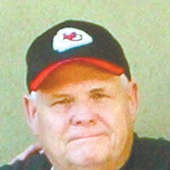Still mad, nearly a decade later
Eight years ago, I wrote a column called "Mad as Hell!" My title paragraph referenced the 1976 multiple Academy Awards winning movie, "Network."
A movie, perhaps best remembered for the one line from Best Actor, Peter Finch, "I'm mad, I'm mad as hell, and I'm not going to take it anymore!" Like Finch, I find I am still mad as hell too, are you?
In that movie, Finch won a best actor award for his portrayal of the character Howard Beale. Beale is a long serving, but aging news anchor. He is being forced out of this job for two reasons, his age and the show's ratings.
This is a tremendous movie, and well deserving of the awards it received. If you have time, rent or download a copy, you will not be disappointed. More importantly, you will see that not very much has changed in the 38 years since its release.
I'm mad as hell about our news, and I am writing this column to say I like Beale, am not going to stand for it anymore. Perhaps some of you will join me in my outrage.
At the apex of my list of news issues that antagonize me, is the use of the two words: breaking news. Those words have become for me much like the boy who cried wolf in the ancient Greek fable.
Multiple times daily, regardless of which news show you are watching, your screen will suddenly fill with a dramatic interruption of explosive symbols, accompanied by equally sensational music (usually including heralding trumpets).
This is followed by the news broadcaster of the moment voicing in a serious grave voice, "we take you now live to... for breaking news."
What follows next, is the beginning of an orchestrated news dance, that is more concerned with how many of you will continue to watch than upon the seriousness of the actual story.
This process follows a few simple paths that rarely vary. The first path is one of dispatch. The breaking news cycle must have speed at its very core. God help the 24-hour network that is late to get its breaking news video on the screen.
Having some type of verification of accuracy before reporting any facts has always been at the bedrock of good honest news reporting. Not so in our television, Internet and smartphone era. Better to be wrong, than late!
The second phase of the news cycle is to get boots on the ground. You hear, "we are now taking you directly to XXX, our reporter on the scene. XXX, what can you tell us?"
Of course that reporter is already a part of the game. They know they have to offer something to galvanize their authenticity or you might decide to change channels. They also like to use phrases like, "we have unconfirmed reports." That surely lets you know your are headed in a factual direction doesn't it?
To give some semblance of veracity and credibility, the next part of the process is to obtain so called witnesses. Microphones are often shoved into the faces of possible victims or their family members when they might be better served by respecting their situation and privacy.
Two recent disasters come to mind as examples, the plane crash in Asia close to two months ago, and the recent mine disaster in Turkey.
In each case, zealous reporters scrambled to get relatives of victims on screen to ask them about the tragedy, and how it was affecting them. Did they blame anyone? Gosh, I would have never suspected that they might blame the airlines or the mine owners without the assistance of these insightful news reporters!
The third phase of breaking news is the honeymoon cycle. These enormous 24-hour networks have teams of people that are very similar to the actuary officials at an insurance corporate office.
Their only responsibility is to determine just how long the breaking news has legs or relevance with the viewing public. Remember the missing plane? That story was covered almost everyday for weeks. Each network paraded a series of so-called "experts," to tell us what we weren't smart enough to figure out for ourselves.
I have only flown over the ocean one time in my life, and that was from the mainland to Hawaii. I can remember thinking as I looked out the window for close to five solid hours seeing nothing but ocean, that if you went down there in a plane it was "curtains!"
From the beginning, after talking with some of my friends who actually served in the Pacific in the Navy, I was almost certain, that they were not going to find that plane. I hope I am proved wrong, but if there was ever a needle in a haystack, this is it.
The networks had a different view, however. As long as viewers were tuning in, and they could show the sponsors the ratings, the programming and the experts continued day after day.
Have you seen much about that lately? Of course not. The breaking news cycle on that story has run out of steam. As soon as the rioters in Turkey settle down, the lost miners will become one more story, moved to the back burner.
For years, the news on television and radio was never profitable. They were offered as services to the public and the rest of the programming paid the bills. Not so anymore.
Twenty-four hour news is big business. Sponsors line up to pay, because they know there are millions out there who will stayed glued to their programs, as long as they can put on a compelling show.
Yes, I'm mad as hell at CNN, FOX, CNBC and the other network news teams. Stop looking for ratings and go back to being reporters. Not all news is breaking or exciting, but that doesn't mean it is not worth airing!

